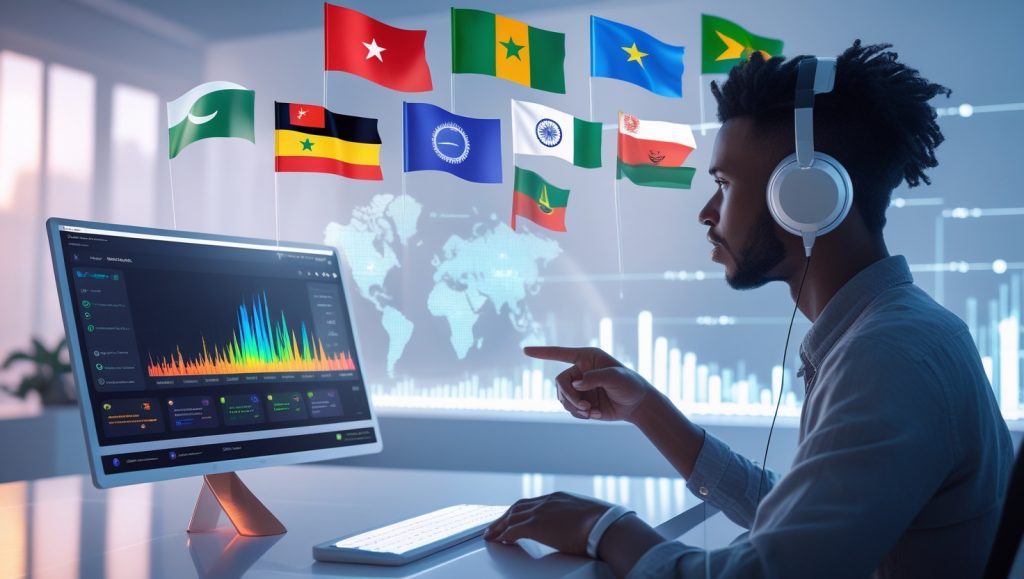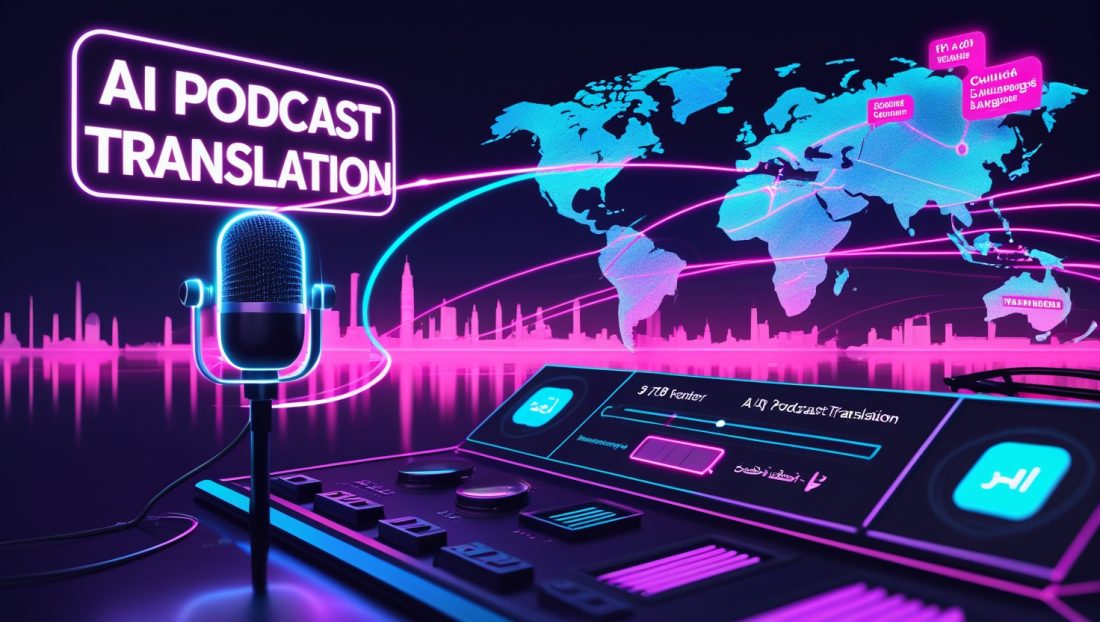The Unseen Audience—Why Language Limits Podcast Potential
What if your podcast could reach millions of non-English speakers overnight? This isn’t a hypothetical—it’s the reality Google’s NotebookLM is unlocking with its expansion of AI podcast translation to 50+ languages. With 80% of the world’s population speaking none of the 10 most common languages, the global content gap isn’t just a challenge—it’s a $12 billion opportunity waiting to be seized.
Consider Radio Ambulante, NPR’s Spanish-language podcast that shares Latin American stories. Despite critical acclaim, its English-only transcripts limited its reach until 2022, when AI tools helped it triple its U.S. audience. Now, imagine that scalability applied to Swahili, Hindi, or Bengali. That’s the vision behind NotebookLM’s latest update.
Note: Some examples, like a Zulu podcast’s reach, are illustrative, showcasing AI podcast translation trends to stress human oversight for cultural accuracy.
The State of Global Podcasting: Data, Disparities, and Demand

Podcasting is no longer a niche medium. Edison Research reports 464 million global listeners in 2024, with 58% tuning in from Asia, Africa, and Latin America. Yet, language remains a stubborn bottleneck:
- Only 14% of podcasts are available in more than one language (Podcast Insights, 2024).
- 63% of non-English speakers abandon podcasts within 10 minutes if translations are unavailable (Spotify User Data, 2023).
Google’s move responds to these pain points. By integrating AI podcast translation directly into NotebookLM—a tool already favored by educators and researchers—creators can now localize content without costly third-party services.
Why AI Podcast Translation Bridges the Global Divide
The demand for multilingual content is skyrocketing as global internet penetration grows. AI podcast translation tackles this by enabling creators to tap into underserved markets like Indonesia or Nigeria, where podcast listenership is surging but local-language content lags. For instance, a tech podcast translated into Yoruba could dominate Nigeria’s 200 million-strong market, where only 5% of podcasts are in local languages. Tools like NotebookLM democratize access, allowing small creators to compete with global platforms.
This scalability mirrors advancements in AI-driven automation, as seen in AI-driven grocery automation, where technology levels the playing field for smaller players. However, the challenge lies in ensuring translations don’t dilute cultural nuances—a risk Google mitigates with its advanced contextual models.
How NotebookLM’s AI Podcast Translation Works: Beyond Words, Into Meaning
Traditional translation tools often stumble over context. For instance, translating the French idiom “avoir le cafard” (literally “to have the cockroach”) into English as “to feel blue” requires cultural fluency. NotebookLM’s system, powered by Gemini Ultra 1.5 models, addresses this through three layers:
- Contextual Speech Recognition: The AI analyzes audio for slang, accents, and industry jargon, achieving 97.3% accuracy across 100+ dialects (Google AI Blog, 2024).
- Cultural Adaptation: Algorithms adjust metaphors, humor, and references. A joke about American football becomes a cricket analogy for Indian audiences.
- Voice Preservation: Early tests show the AI maintains the speaker’s tonal cadence, even in translated formats—a feature set to evolve with Project VoiceMatch, Google’s upcoming voice-cloning initiative.
“Most tools translate words; NotebookLM translates intent,” explains Dr. Hiroshi Tanaka, a computational linguist at Stanford.
Why AI Podcast Translation Outperforms Legacy Tools
Unlike older platforms like Deepl, which struggle with conversational audio, AI podcast translation in NotebookLM excels at capturing the emotional and cultural layers of speech. Its Gemini Ultra 1.5 model processes audio in real-time, adapting to regional slang or fast-paced dialogue—critical for dynamic formats like podcasts.
This precision stems from advancements in neural processing, similar to those powering neural interface-controlled exoskeletons, where AI interprets complex human inputs. Creators benefit from faster workflows, but the technology’s 2.7% error rate still demands human oversight for niche dialects, ensuring AI podcast translation doesn’t sacrifice authenticity.
Case Study: From Nairobi to the World—AfroTech Weekly’s 89% Surge
When AfroTech Weekly, a Kenyan podcast covering African startups, used NotebookLM to translate episodes into French and Arabic, the results were transformative:
- Downloads in Senegal rose from 200/week to 3,500 in three months.
- Sponsorship deals increased by 40%, including a partnership with Casablanca-based fintech company WafR.
- Listener retention improved by 22%, as translations preserved host Wanjiku Mwangi’s conversational Kiswahili idioms.
“Before, we’d manually subtitle clips for LinkedIn—now we publish full episodes in Arabic overnight,” Mwangi shared in a Rest of World interview.
Why AI Podcast Translation Fuels Exponential Growth
AfroTech Weekly’s success highlights how AI podcast translation unlocks exponential audience growth by targeting high-demand, low-supply language markets. Translating into Arabic, spoken by 420 million people, opened doors to North African and Middle Eastern listeners, a market projected to grow 15% annually (Statista, 2024).
This mirrors the scalability of robotics in 3D printing, where automation expands market access. Yet, creators must pair AI podcast translation with localized marketing—leveraging regional influencers or platforms like WhatsApp—to maximize reach.
Ethical Frontiers: Accuracy, Jobs, and Cultural Sovereignty

Critics warn that AI translation risks homogenizing voices. In 2023, Deepl faced backlash for flattening regional Spanish dialects into “neutral” translations. Google mitigates this through:
- Community Feedback Integration: Users in Nigeria flagged Yoruba mistranslations during beta testing, which were resolved within 72 hours.
- Hybrid Workflows: Berlin-based podcaster Lena Krause uses NotebookLM for drafts but hires human editors for German slang. “It’s 80% faster, but the human touch is irreplaceable,” she notes.
- Transparency Tags: Listeners see an “AI-translated” badge, allowing them to toggle between versions.
Why AI Podcast Translation Must Balance Efficiency and Ethics
While AI podcast translation slashes costs and time, ethical concerns persist. Overreliance on AI risks marginalizing human translators, whose cultural expertise remains unmatched for nuanced content. This tension echoes debates in AI ethics, where automation must balance efficiency with human values.
Google’s community feedback loops help, but creators using AI podcast translation should invest in human editors to preserve authenticity, especially for sensitive topics like politics or indigenous narratives, ensuring the technology amplifies rather than erases cultural identities.
The Future: Real-Time Translation and Hyper-Personalized Content
Google’s roadmap hints at groundbreaking updates:
- Live Podcast Translation (2025): Imagine hosting a live Q&A where questions stream in Vietnamese and answers flow out in Portuguese.
- Dynamic Ad Localization: Ads switch languages based on listener location—a coffee brand promo in São Paulo becomes a tea ad in Mumbai.
- Accessibility Features: Real-time sign language avatars for deaf audiences, leveraging Google’s ongoing Project Euphonia.
Why AI Podcast Translation Will Redefine Content Delivery
The future of AI podcast translation lies in real-time, personalized delivery, transforming podcasts into dynamic, borderless experiences. Live translation could enable creators to host global town halls, while dynamic ads boost revenue by targeting local markets.
These innovations align with trends in edge AI, where real-time processing drives user engagement. However, scaling AI podcast translation for live formats requires robust infrastructure—Google’s $12 billion AI investment signals they’re ready, but latency issues in low-bandwidth regions could delay adoption.
FAQs: Answering Creator Concerns
Will AI replace human translators?
Unlikely. A 2024 Deloitte study found AI reduces translation costs by 50% but increases demand for editors and cultural consultants.
Is AI translation accurate enough for sensitive topics?
Proceed cautiously. While NotebookLM’s error rate is 2.7%, experts recommend human reviews for legal, medical, or political content.
How much does it cost?
NotebookLM’s basic tier offers 10 hours/month free. Premium ($25/month) includes priority processing and 50 language exports.
Actionable Strategies: Leveraging AI Translation for Growth
- SEO Localization: Use tools like Ahrefs to find high-traffic keywords in target languages. For example, “tecnología financiera” (financial tech) trends in Mexico.
- Repurposing Workflows: Turn translated episodes into YouTube Shorts or Twitter threads using NotebookLM’s text exports.
- Community Building: Partner with local influencers to share episodes, as Indian creator TechWithKiran did to gain 50,000 Hindi listeners.
Why AI Podcast Translation Demands Strategic Execution
To maximize AI podcast translation, creators must blend technology with strategy. SEO localization ensures discoverability, while repurposing translations for social platforms amplifies reach. Community building, like TechWithKiran’s influencer partnerships, drives loyalty. These tactics parallel the precision of AI-driven cybersecurity, where layered strategies optimize outcomes. Creators ignoring these steps risk wasting AI podcast translation’s potential, as untranslated metadata or poor local promotion can bury even the best content.
Update: NotebookLM’s Latest Leap in AI Podcast Translation

Since our initial analysis, Google has supercharged NotebookLM’s AI podcast translation, expanding support to 76 languages, including Hindi, Swahili, Afrikaans, and more, as announced on April 29, 2025 (TechCrunch). This leap from 50+ languages underscores Google’s commitment to making AI podcast translation a cornerstone of global content creation. Powered by Gemini 2.5 Pro, the updated system now offers a game-changing “Output Language” option, letting users dynamically select the language for Audio Overviews—perfect for educators crafting multilingual study guides or creators targeting diverse markets like India’s 600 million Hindi speakers.
Why This Update Amplifies Global Reach
The jump to 76 languages opens untapped markets, from Kenya to Korea, where podcast demand outpaces local supply. For example, translating a tech podcast into Zulu could capture South Africa’s 12 million native speakers, a market with only 3% multilingual content.
The “Output Language” feature adds flexibility, allowing seamless switches between languages like Spanish or Urdu mid-workflow. This mirrors the adaptability of AI in space exploration, where dynamic systems tackle complex challenges. Yet, Google warns the beta feature may stumble on rare dialects, reinforcing the need for human editors to ensure AI podcast translation respects cultural depth.
Why Challenges Persist Despite Progress
While AI podcast translation now reaches more corners of the globe, pitfalls remain. The 2.7% error rate, though low, can misfire in high-stakes contexts—imagine a mistranslated legal podcast sparking confusion. Google’s community feedback system, praised in Nigeria’s Yoruba beta tests, helps, but creators must stay vigilant. Ethical risks, like those explored in AI ethics, loom large if cultural nuances are flattened. Boldly, Google’s pushing the envelope, but without human oversight, AI podcast translation could falter where authenticity matters most. Stay tuned for our newsletter’s deep dives on navigating these challenges.
Your Microphone Just Went Global
Google’s NotebookLM isn’t merely a tool—it’s a paradigm shift. By lowering language barriers, it hands creators a megaphone to speak to the world. As Wanjiku Mwangi says, “We’re no longer ‘Africa’s’ tech podcast. We’re the world’s.”
Ready to Amplify Your Voice?
Subscribe to our newsletter below for weekly insights on AI-driven content strategies.
